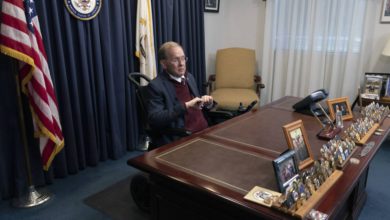Ohio has a new crop of state lawmakers. Twenty new state House representatives and six new state senators were sworn in Monday as part of the 134th General Assembly.
But the continuing presence of a veteran lawmaker is what stood out.

When the legislature voted without dissent to remove Larry Householder as speaker of the House last summer after federal authorities charged him and four associates in a $60 million racketeering scheme, several Republicans said they opposed also kicking him out as a lawmaker because he could simply win re-election again in November and get his seat back for a new term in January.
So Householder wasn't dumped last year, he easily defeated two write-in candidates and was sworn-in for another term Monday.
Will the GOP representative from Perry County who is facing 20 years in a federal prison be removed now?
Not just yet, says his successor, Bob Cupp of Lima.
"We have 20 new members of the legislature. We have not discussed it yet. We will be discussing it, and we will go from there," Cupp responded when asked whether he planned to expel Householder from the chamber.
Householder, who maintains his innocence, is accused by federal prosecutors of conspiring to bribe his way back to power and enact House Bill 6, a $1 billion bailout law for two northern Ohio nuclear power plants.
Back in October, Cupp — a former Ohio Supreme Court justice — told reporters he wouldn't remove the former speaker because his interpretation of Ohio law was that a reason to expel a member could only be used once. Householder had three months left in that General Assembly. He now has 24 months left in this one.
"The honorable thing for him to do would be to resign," Cupp said then.
However, Householder has steadfastly refused to step down, and he apparently will suffer no further consequences for the foreseeable future.
Meanwhile, other lawmakers all have ideas about what laws should be passed and what should be their party's priorities. Here are some of the plans being formulated as the two-year session gets underway:
Health orders
A number of Republican lawmakers were frustrated by Gov. Mike DeWine's response to the coronavirus pandemic. They didn't agree with some of his administration's health orders and business closures. A few even went so far as to introduce articles of impeachment.
But Republican Matt Huffman, the newly elected Senate president, told reporters he thinks there's a better way to handle these issues in the future. He is working on a bill that would create a legislative oversight panel.
“It’s my view that there should be a legislative panel, much like those that exist in other states, that can more quickly and nimbly react to department orders," Huffman said.
The panel would be able to revise or revoke the governor's health orders after a certain period.
"It gives clarity to the public," Huffman said. "It gives clarity to the executive branch and to the legislation that these things can be dealt with quickly and by a select group of legislators."
The Lima Republican added that he doesn't see this bill, which is being drafted, as a direct response to the way DeWine has handled the pandemic.
"We are trying to create a system that is for any governor or any legislature that's in place," he said.
House Bill 6
It's also unclear what's going to happen to the law at the center of the pending criminal case against Householder, longtime lobbyist Neil Clark, former Ohio GOP Chairman Matt Borges and two others who already have admitted wrongdoing.
Ohio electricity customers were supposed to start paying monthly surcharges in January, but the Ohio Supreme Court put that on hold while it hears arguments in a case about the law's legality.
Both Cupp and Huffman said they were talking to each other as well as their members about whether to repeal and/or replace HB 6. But Democrats don't want to wait.
Rep. David Leland, D-Columbus, said in a statement that he's frustrated by the "inability" of lawmakers to take action on HB 6 and proposed a new bill on the session's opening day to get rid of the law.
“We have to repeal House Bill 6 — the product of what the FBI calls the largest bribery scandal in Ohio history,” Leland said.
Education funding
Both Huffman and Cupp said creating a new funding formula for Ohio's public schools was on their to-do list for 2021.
In the Senate, the plan appears to be to weave any changes into the state's new two-year budget. The current budget expires at the end of June.
Cupp, on the other hand, spent the last General Assembly working on a new formula that would have changed how districts calculate their wealth, removed exceptions to the rules and paid for school vouchers directly rather than sending the money to the local district first.
The speaker said he'd like to see that work continue.
Broadband access
One of Cupp's other priorities for these first months is expanding access to high-speed internet across the state.
"The pandemic has really highlighted the discrepancies in availability," he said, adding that it impacts businesses and student learning.
Rep. Rick Carfagna, a Republican from southern Delaware County, sponsored a bill last session that would have created a grant program for companies willing to lay broadband cables. That piece of legislation didn't make it across the finish line, but Carfagna was happy to hear it's still a possibility.
The governor earmarked $20 million for broadband in fiscal year 2021, which ends in June. Without a law, that money will disappear.
"If we can fast track it and get it through quick enough, maybe we can start doling it all out," Carfagna said. "We'd have to move it extremely fast, but I am all in favor of that."
@annastaver
Source link









